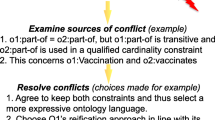Abstract
Ontology reuse has played an important role in developing the shared knowledge in Semantic Web. The ontology reuse enables knowledge sharing more easily between ontology-based intelligent systems. In meanwhile, we are still facing the challenging task of solving the conflict potentials in the ontology integration at syntactic and semantic levels. On one aspect of considering knowledge conflicts during the integration process, we try to find the meaningfulness of the conflicting knowledge that means a consensus among conflicts in integrating ontologies. This paper presents a novelty method for finding the consensus in ontology integration at the concept level. Our approach is based on the consensus theory and distance functions between attributes’ values.
Access this chapter
Tax calculation will be finalised at checkout
Purchases are for personal use only
Similar content being viewed by others
Notes
- 1.
- 2.
- 3.
tkb is an acronym for “thoi khoa bieu” in Vietnamese, which is equals to “schedule” in English.
References
Barthélemy, J.P., Janowitz, M.F.: A formal theory of consensus. SIAM J. Discrete Math. 4(3), 305–322 (1991)
Bizer, C., Heath, T., Berners-Lee, T.: Linked data-the story so far. Int. J. Semant. Web Inf. Syst. (IJSWIS) 5(3), 1–22 (2009)
Dastgheib, S., Mesbah, A., Kochut, K.: MOntage: building domain ontologies from linked open data. In: Proceedings of the 2013 IEEE Seventh International Conference on Semantic Computing, ICSC 2013, pp. 70–77. IEEE Computer Society, Washington, DC (2013). http://dx.org/10.1109/ICSC.2013.21
Duong, T.H., Nguyen, N.T., Kozierkiewicz-Hetmanska, A., Jo, G.: Fuzzy ontology integration using consensus to solve conflicts on concept level. In: ACIIDS Posters, pp. 33–42 (2011)
Euzenat, J.: Towards a principled approach to semantic interoperability. In: Proceedings of the 2001 Workshop on Ontology and Information Sharing, pp. 19–25 (2001)
Euzenat, J., Shvaiko, P.: Ontology Matching, 2nd edn. Springer, Heidelberg (2013)
Ge, J., Qiu, Y.: Concept similarity matching based on semantic distance. In: Proceedings of the Fourth International Conference on Semantics Knowledge and Grid, pp. 380–383. IEEE (2008)
Jain, P., Hitzler, P., Sheth, A.P., Verma, K., Yeh, P.Z.: Ontology alignment for linked open data. In: Patel-Schneider, P.F., Pan, Y., Hitzler, P., Mika, P., Zhang, L., Pan, J.Z., Horrocks, I., Glimm, B. (eds.) ISWC 2010, Part I. LNCS, vol. 6496, pp. 402–417. Springer, Heidelberg (2010). http://dl.acm.org/citation.cfm?id=1940281.1940308
Jain, P., Yeh, P.Z., Verma, K., Vasquez, R.G., Damova, M., Hitzler, P., Sheth, A.P.: Contextual ontology alignment of LOD with an upper ontology: a case study with proton. In: Antoniou, G., Grobelnik, M., Simperl, E., Parsia, B., Plexousakis, D., De Leenheer, P., Pan, J. (eds.) ESWC 2011, Part I. LNCS, vol. 6643, pp. 80–92. Springer, Heidelberg (2011). http://link.springer.com/10.1007/978-3-642-21034-1_6
Klein, M.: Combining and relating ontologies: an analysis of problems and solutions. In: Proceedings of the 2001 Workshop on Ontologies and Information Sharing, vol. 47, pp. 53–62 (2001). http://citeseerx.ist.psu.edu/viewdoc/summary?doi=10.1.1.13.3504
Nguyen, N.T.: Representation choice methods as the tool for solving uncertainty in distributed temporal database systems with indeterminate valid time. In: Monostori, L., Váncza, J., Ali, M. (eds.) IEA/AIE 2001. LNCS (LNAI), vol. 2070, pp. 445–454. Springer, Heidelberg (2001)
Nguyen, N.T.: Consensus system for solving conflicts in distributed systems. Inf. Sci. 147(1), 91–122 (2002)
Nguyen, N.T.: Advanced Methods for Inconsistent Knowledge Management. Springer, London (2007)
Nikolov, A., Uren, V., Motta, E., de Roeck, A.: Overcoming schema heterogeneity between linked semantic repositories to improve coreference resolution. In: Gómez-Pérez, A., Yu, Y., Ding, Y. (eds.) ASWC 2009. LNCS, vol. 5926, pp. 332–346. Springer, Heidelberg (2009)
Zgrzywa, M.: Consensus determining with dependencies of attributes with interval values. J. Univ. Comput. Sci. 13(2), 329–344 (2007)
Author information
Authors and Affiliations
Corresponding author
Editor information
Editors and Affiliations
Rights and permissions
Copyright information
© 2016 Springer-Verlag Berlin Heidelberg
About this chapter
Cite this chapter
Van Nguyen, T., Hoang, H.H. (2016). A Consensus-Based Method for Solving Concept-Level Conflict in Ontology Integration. In: Nguyen, N.T., Kowalczyk, R. (eds) Transactions on Computational Collective Intelligence XXII. Lecture Notes in Computer Science(), vol 9655. Springer, Berlin, Heidelberg. https://doi.org/10.1007/978-3-662-49619-0_6
Download citation
DOI: https://doi.org/10.1007/978-3-662-49619-0_6
Publisher Name: Springer, Berlin, Heidelberg
Print ISBN: 978-3-662-49618-3
Online ISBN: 978-3-662-49619-0
eBook Packages: Computer ScienceComputer Science (R0)




